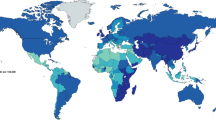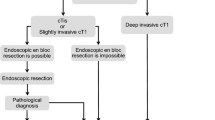Abstract
Background
In the USA, race and socioeconomic status are well-known factors associated with colorectal cancer incidence and mortality rates. These are higher among blacks than whites and other racial/ethnic groups.
Methods
In this article, we review opportunities to address disparities in colorectal cancer incidence, mortality, and survivorship among African Americans.
Results
First, we summarize the primary prevention of colorectal cancer and recent advances in the early detection of the disease and disparities in screening. Then, we consider black-white disparities in colorectal cancer treatment and survival including factors that may contribute to such disparities and the important roles played by cultural competency, patient trust in one’s physician, and health literacy in addressing colorectal cancer disparities, including the need for studies involving the use of colorectal cancer patient navigators who are culturally competent.
Conclusion
To reduce these disparities, intervention efforts should focus on providing high-quality screening and treatment for colorectal cancer and on educating African Americans about the value of diet, weight control, screening, and treatment. Organized approaches for delivering colorectal cancer screening should be accompanied by programs and policies that provide access to diagnostic follow-up and treatment for underserved populations.

Similar content being viewed by others
References
American Cancer Society. Cancer facts & figures 2015. Atlanta, GA: ACS; 2014.
Albano JD, Ward E, Jemal A, et al. Cancer mortality in the United States by education level and race. J Natl Cancer Inst. 2007;99:1384–94.
Howlader N, Noone AM, Krapcho M, et al. (eds). SEER Cancer Statistics Review, 1975–2011, National Cancer Institute. Bethesda, MD, http://seer.cancer.gov/csr/1975_2011/.
Siegel R, Desantis C, Jemal A. Colorectal cancer statistics, 2014. CA Cancer J Clin. 2014;64:104–17.
Tammana VS, Laiyemo AO. Colorectal cancer disparities: issues, controversies and solutions. World J Gastroenterol. 2014;20:869–76.
Powe BD, Cooper DL, Harmond L, et al. Comparing knowledge of colorectal and prostate cancer among African American and Hispanic men. Cancer Nurs. 2009;32:412–7.
Coughlin SS, Thompson T. Physician recommendation for colorectal cancer screening by race, ethnicity, and health insurance status among men and women in the United States, 2000. Health Promot Pract. 2005;6:369–78.
CDC Health Disparities & Inequalities Report—United States, 2013. MMWR Suppl 2013;62:1–187.
USDA Economic Research Service. 1994–1996 and 1998 Continuing Survey of Food Intakes by Individuals, 2000. Available from: http://www.ers.usda.gov/data-products/commodity-consumption-by-population-characteristics/documentation.aspx
Ou J, Delany JP, Zhang M, et al. Association between low colonic short-chain fatty acids and high bile acids in high colon cancer risk populations. Nutr Cancer. 2012;64:34–40.
Ou J, Carbonero F, Zoetendal EG, et al. Diet, microbiota, and microbial metabolites in colon cancer risk in rural Africans and African Americans. Am J Clin Nutr. 2013;98:111–20.
Hester CM, Jala VR, Langille MG, et al. Fecal microbes, short chain fatty acids, and colorectal cancer across racial/ethnic groups. World J Gastroenterol. 2015;7:2759–69.
Schatzkin A, Lanza E, Corle D, et al. Lack of effect of a low-fat, high-fiber diet on the recurrence of colorectal adenomas. Polyp Prevention Trial Study Group. N Engl J Med. 2000;342:1149–55.
Chacko L, Macaron C, Burke CA. Colorectal cancer screening and prevention in women. Dig Dis Sci. 2015;60:698–710.
Eloubeidi MA, Wallace MB, Desmond R, et al. Female gender and other factors predictive of a limited screening flexible sigmoidoscopy examination for colorectal cancer. Am J Gastroenterol. 2003;98:1634–9.
Syngal S, Brand RE, Church JM, et al. ACG clinical guideline: genetic testing and management of hereditary gastrointestinal cancer syndromes. Am J Gastroenterol. 2015;110:223–62.
Decker KM, Singh H. Reducing inequities in colorectal cancer screening in North America. J Carcinogenesis. 2014;13:12.
Hewitson P, Glasziou P, Watson E, et al. Cochrane systematic review of colorectal cancer screening using the fecal occult blood test (hemoccult): an update. Am J Gastroenterol. 2008;103:1541–9.
Zauber AG. The impact of screening on colorectal cancer mortality and incidence: has it really made a difference? Dig Dis Sci. 2015;60:681–91.
Shapiro JA, Klabunde CN, Thompson TD, et al. Patterns of colorectal cancer test use, including CT colonography, in the 2010 National Health Interview Survey. Cancer Epidemiol Biomark Prev. 2012;21:895–904.
Steele CB, Rim SH, Joseph DA, et al. Colorectal cancer incidence and screening—United States, 2008 and 2010. MMWR Surveill Summ. 2013;62(Suppl 3):53–60.
Almario CV, May FP, Ponce NA, Spiegel BM. Racial and ethnic disparities in colonoscopic examination of individuals with a family history of colorectal cancer. Clin Gastroenterol Hepatol. 2015;28.
Green BB, Coronado GD, Devoe JE, Allison J. Navigating the murky waters of colorectal cancer screening and health reform. Am J Public Health. 2014;104:982–6.
Bromley EG, May FP, Federer L, et al. Explaining persistent under-use of colonoscopic cancer screening in African Americans: a systematic review. Prev Med. 2015:40–8.
Colman Wallace DA, Baltrus PT, Wallace TC, et al. Black white disparities in receiving a physician recommendation for colorectal cancer screening and reasons for not undergoing screening. J Health Care Poor Underserved. 2013;24:1115–24.
Ahmed NU, Pelletier V, Winter K, Albatineh AN. Factors explaining racial/ethnic disparities in rates of physician recommendation for colorectal cancer screening. Am J Public Health. 2013;103:e91–9.
Cooper GS, Doug KT. Underuse of colorectal cancer screening in a cohort of Medicare beneficiaries. Cancer. 2008;112:293–9.
Sabatino SA, Lawrence B, Elder R, et al. Effectiveness of interventions to increase screening for breast, cervical, and colorectal cancers. Nine updated systematic reviews for the guide to community preventive services. Am J Prev Med. 2012;43:97–118.
Rawl SM, Skinner CS, Perkins SM, et al. Computer-delivered tailored intervention improves colon cancer screening knowledge and health beliefs of African-Americans. Health Educ Res. 2012;27:868–85.
Christy SM, Perkins SM, Tong Y, et al. Promoting colorectal cancer screening discussion: a randomized controlled trial. Am J Prev Med. 2013:325–9.
Myers RE, Sifri R, Daskalakis C, et al. Increasing colon cancer screening in primary care among African Americans. J Natl Cancer Inst. 2014;106.
DeGroff A, Coa K, Morrissey KG, et al. Key considerations in designing a patient navigation program for colorectal cancer screening. Health Promot Pract. 2013;15:483–95.
Green BB, Wang CY, Anderson ML, et al. An automated intervention with stepped increases in support to increase uptake of colorectal cancer screening: a randomized trial. Ann Intern Med. 2013;158:301–11.
Liu G, Perkins A. Using a lay cancer screening navigator to increase colorectal cancer screening rates. J Am Board Fam Med. 2015;28:280–2.
Berkowitz SA, Percac-Lima S, Ashburner JM, et al. Building equity into quality improvement: reducing socioeconomic disparities in colorectal cancer screening as part of population health management. J Gen Intern Med 2015
Horne HN, Phelan-Emrick DF, Pollack CE, et al. Effect of patient navigation on colorectal cancer screening in a community-based randomized controlled trial of urban African American adults. Cancer Causes Control. 2015;26:239–46.
Shavers VL. Racial/ethnic variation in the anatomic subsite location of in situ and invasive cancers of the colon. J Natl Med Assoc. 2007;99:733–48.
Simpson DR, Martinez ME, Gupta S, et al. Racial disparity in consultation, treatment, and the impact on survival in metastatic colorectal cancer. J Natl Cancer Inst. 2013;105:1814–20.
Albain KS, Unger JM, Crowley JJ, et al. Racial disparities in cancer survival among randomized clinical trials patients of the Southwest Oncology Group. J Natl Cancer Inst. 2009;101:984–92.
Le H, Ziogas A, Lipkin SM, Zell JA. Effects of socioeconomic status and treatment disparities in colorectal cancer survival. Cancer Epidemiol Biomark Prev. 2008;17:1950–62.
Bach PB, Schrag D, Brawley OW, et al. Survival of blacks and whites after a cancer diagnosis. Jama. 2002;287:2106–13.
Robb KA, Miles A, Wardle J. Demographic and psychosocial factors associated with perceived risk for colorectal cancer. Cancer Epidemiol Biomark Prev. 2004;13:366–72.
Hillen MA, de Haes HC, Smets EM. Cancer patients’ trust in their physician—a review. Psychooncology. 2011;20:227–41.
Coughlin SS, Matthews-Juarez P, Juarez P, et al. Opportunities to address lung cancer disparities among African Americans. Cancer Med. 2014;3:1467–76.
Makoul G, Curry RH. The value of assessing and addressing communication skills. JAMA. 2007;298:1057–9.
Diefenbach M, Turner G, Carpenter KM, et al. Cancer and patient-physician communication. J Health Commun. 2009;14(Suppl 1):57–65.
Institute of Medicine. Health literacy: a prescription to end confusion. Washington, DC: National Academics Press; 2004.
Berkman ND, Sheridan SL, Donahue KE, et al. Low health literacy and health outcomes: an updated systematic review. Ann Int Med. 2011;155:97–107.
Davis TC, Williams MV, Marin E, et al. Health literacy and cancer communication. CA Cancer J Clin. 2002;52:134–49.
Paasche-Orlow MK, Wolf MS. The causal pathways linking health literacy to health outcomes. Am J Health Behav. 2007;31:S19–26.
Friedman DB, Hoffman-Goetz L. Assessment of cultural sensitivity of cancer information in ethnic print media. J Health Commun. 2006;11:425–77.
Coleman C Teaching health care professionals about health literacy: a review of the literature. Nurs Outlook. 2011;59:70–8.
Haynes MA, Smedley BD (eds) The unequal burden of cancer: an assessment of NIH research and programs for ethnic minorities and the medically underserved. National Academics Press, 1999.
Van Ryn M, Burke J. The effect of patient race and socioeconomic status on physicians’ perceptions of patients. Soc Sci Med. 2000;50:813–28.
Hendren S, Griggs JJ, Epstein RM, et al. Study protocol: a randomized controlled trial of patient navigation-activation to reduce cancer health disparities. BMC Cancer. 2010;10:551.
Meade CD, Wells KJ, Arevalo M, et al. Lay navigator model for impacting cancer health disparities. J Cancer Educ. 2014;29:449–57.
Freeman HP. The origin, evolution, and principles of patient navigation. Cancer Epidemiol Biomark Prev. 2012;21:1614–7.
Freund KM, Battaglia TA, Calhoun E, et al. The NCI patient navigation research program methods, protocol and measures. Cancer. 2008;113:3391–9.
American College of Surgeons Commission on Cancer. Cancer Program Standards 2012.
Braverman PA, Cubbin C, Egerter S, et al. Socioeconomic disparities in health in the United States: what the patterns tell us. Am J Public Health. 2010;100(Suppl 1):S186–96.
Institute of Medicine. Unequal treatment: confronting racial and ethnic disparities in health care. Washington, DC: IOM; 2002.
Smith S, Johnson L, Wesley D, et al. Translation to practice of an intervention to promote colorectal cancer screening among African Americans. Clin Trans Sci. 2012;5:412–5.
Smith SA, Blumenthal DS. Efficacy to effectiveness transition of an educational program to increase colorectal cancer screening (EPICS): study protocol of a cluster randomized trial. Implement Science 2013;8 www.implementationscience.com/content/8/1/86 [accessed March 26, 2015]
Thompson VL, Drake B, James AS, et al. A community coalition to address cancer disparities: transitions, successes and challenges. J Cancer Educ 2014
National Comprehensive Cancer Network guidelines for patients http://www.nccn.org/patients/guidelines/colon/index.html#42 [Accessed on April 15, 2015].
Rhoads KF, Patel MI, Ma Y, Schmidt LA. How do integrated health care systems address racial and ethnic disparities in colon cancer? J Clin Oncol. 2015;33:854–60.
Tu S, Young VM, Coombs LJ, et al. Practice adaptive reserve and colorectal cancer screening best practices at community health center clinics in 7 states. Cancer 2014
Adams SA, Choi SK, Khang L, et al. Decreased mortality-to-incidence ratios with increased accessibility of federally qualified health centers. J Community Health 2015
CDC Colorectal Cancer Control Program, Division of Cancer Prevention and Control, 2015 www.cdc/cancer.gov/crccp [Accessed March 26, 2015]
Gupta S, Sussman DA, Doubeni CA, et al. Challenges and possible solutions to colorectal cancer screening for the underserved. J Natl Cancer Inst 2014;106:dju032.
Nadel MR, Royalty J, Shapiro JA, et al. Assessing screening quality in the CDC’s colorectal cancer screening demonstration program. Cancer. 2013;119(Suppl 15):2834–41.
Levine RS, Rust GS, Pisu M, et al. Increased black-white disparities in mortality after the introduction of lifesaving innovations: a possible consequence of US federal laws. Am J Public Health. 2010;100:2176–84.
Author information
Authors and Affiliations
Corresponding author
Ethics declarations
Source of Funding
This work is funded by the National Cancer Institute (1R01CA166785-01).
Conflict of Interest
The authors declare that they have no competing interests.
Ethical Approval
This article does not contain any studies with human participants performed by any of the authors.
Rights and permissions
About this article
Cite this article
Coughlin, S.S., Blumenthal, D.S., Seay, S.J. et al. Toward the Elimination of Colorectal Cancer Disparities Among African Americans. J. Racial and Ethnic Health Disparities 3, 555–564 (2016). https://doi.org/10.1007/s40615-015-0174-z
Received:
Revised:
Accepted:
Published:
Issue Date:
DOI: https://doi.org/10.1007/s40615-015-0174-z




